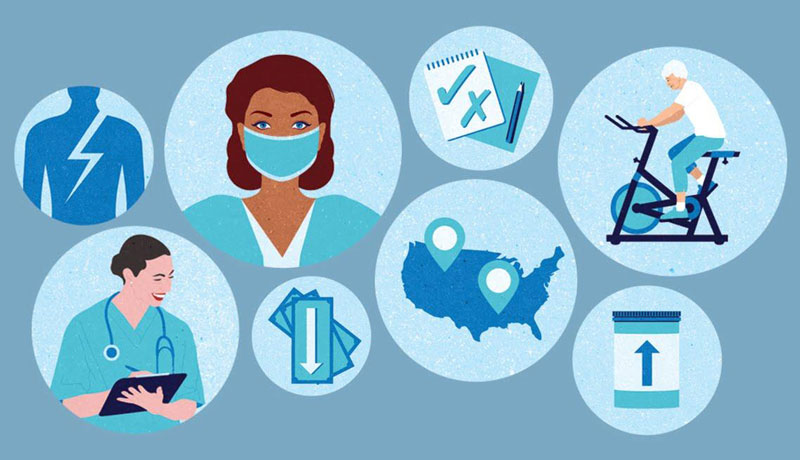

Why Did Medicare Part B Premiums Rise?
Oct 20, 2023 By Susan Kelly
Increases in Medicare Part B premium, deductible, and coinsurance for next year have been announced by the Centers for Medicare and Medicaid Services (CMS). Monthly Medicare Part B premiums will rise to $170.10 in 2022, up from $148.50 in 2021, an increase of $21.60. This is a rise of 14.5%. Medicare Part B members will have an annual deductible of $233 in 2022, with an increase of $30 over the yearly deductible of $203 in 2020.
With growing healthcare costs and use, CMS predicted that rates would rise year-over-year, coupled with expected increases in treatment intensity in the next year. As a result of the many unanswered questions about Medicare recipients' potential use of the Alzheimer's medication AduhelmTM, the FDA has additionally recommended further reserves.
Premium and Deductible for Medicare Part B

Medicare Part B offers a wide range of medical and health services not always covered by Medicare Part A, including doctor visits, outpatient hospital stays, home health services, medical supplies, and more. All these rates are established using a formula based on the Social Security Act. There will be a $21.60 rise from the current standard monthly premium of $148.50 for Medicare Part B members to the new standard monthly premium of $170.10 in 2022. There will be a $30 rise in the yearly deductible for any Medicare Part B users in 2022. The following factors will result in higher Part B premiums and deductibles in 2022:
- Prices and use in the healthcare system continue to rise, which leads to an increase in premiums year-to-year.
- As a result of actions taken by Congress to significantly reduce the increase inside the Medicare Part B premium that was scheduled to take effect in 2021, the increase of $3.00 per beneficiary each for a month inside the Medicare Part B premium (which was originally scheduled to end in 2021) will now take effect through 2025.
- Contingency funds have been set aside because of the uncertainties surrounding using Alzheimer's medicine AduhelmTM by Medicare recipients. In July of 2021, the Centers for Medicare as well as Medicaid Services (CMS) began the process known as the National Coverage Determination in order to determine whether or not Medicare would cover AduhelmTM as well as other Alzheimer's disease treatments, and if so, under what circumstances. Until that procedure is complete, there is no guarantee that Medicare users will be able to utilize such medications in 2022. Our forecast does not mean that the insurance company will make a certain choice. It's still possible that this expensive Alzheimer's medication will be reimbursed by Medicare, which might lead to higher costs for the government if it's covered.
Open Enrollment for Medicare and Programs to Save Money on Medicare

This year, starting October 15th, the Medicare Open Enrollment period runs until December 7th. During this time, Medicare-eligible individuals may compare Medicare Advantage, Original Medicare, as well as Part D prescription drug plans for 2022 coverage. In addition to the premiums & cost-sharing information that was just recently made available for 2022 Medicare Advantage as well as Part D plans, the premiums & cost-sharing information that was just made available today for Fee-for-Service Medicare will enable people who have Medicare to understand all of their Medicare insurance options for the year that is to come. To make the best decisions for your healthcare, Medicare beneficiaries need to review their coverage options each year and choose the plan that best meets their requirements.
Seniors and persons with disabilities with a low income may be eligible to receive financial support from the Medicare Savings Programs. This assistance may help them pay for their Medicare coverage (MSPs). The MSPs provide low-cost, high-quality health care to millions of Americans, but only approximately half of those who qualify are enrolled. For eligible individuals, Medicare Supplement Plans (MSPs) assist with the payment of Medicare premiums and Medicare deductibles, coinsurance, and copayments. Allowing consumers to use the money saved by enrolling in an MSP on other necessities, such as food, housing, and transportation, is a major benefit of an MSP.
Conclusion
Despite this year's steep premium increase, there is some positive news to report. CMS is exploring a reduction in the premiums. This year's Part B premium for AduhelmTM has been reduced from $56,000 to $28,200 due to a lack of interest in the medicine that Biogen manufactures. This decline has motivated Health & Human Services Director, Becerra, to ask CMS to reassess the Part B premium for 2022, with the possibility of lowering the amount. All Medicare recipients would be delighted by this development.
-
 Taxes Jan 14, 2024
Taxes Jan 14, 2024Tax Implications of GoFundMe Donations: Insights on Crowdfunding Taxation
Taxable GoFundMe donations? Gain crowdfunding tax advice and understand the consequences of your generous donations. Inform yourself to prevent tax surprises.
-
 Investment Nov 26, 2024
Investment Nov 26, 2024Non-Deliverable Swaps: Demystifying the Global Currency Risk Hedge
Explore the world of Non-Deliverable Swaps (NDS), a key financial tool for managing currency risks in markets with exchange controls. Learn how NDS works with examples.
-
 Investment Feb 21, 2024
Investment Feb 21, 2024Analyzing Municipal Bonds: Is Investing in Munis the Right Choice?
Local governments sell Municipal bond ETFs to fund public projects. Investors support infrastructure and community development with interest and tax breaks. Read more.
-
 Know-how Oct 06, 2023
Know-how Oct 06, 2023FSAs For Dependent Care: A User's Guide
The cost of providing care for children and other dependents is a significant burden for many households in the United States. There are millions of people who are unable to work without access to child care, and others who are the primary caregivers for elderly parents or disabled family members